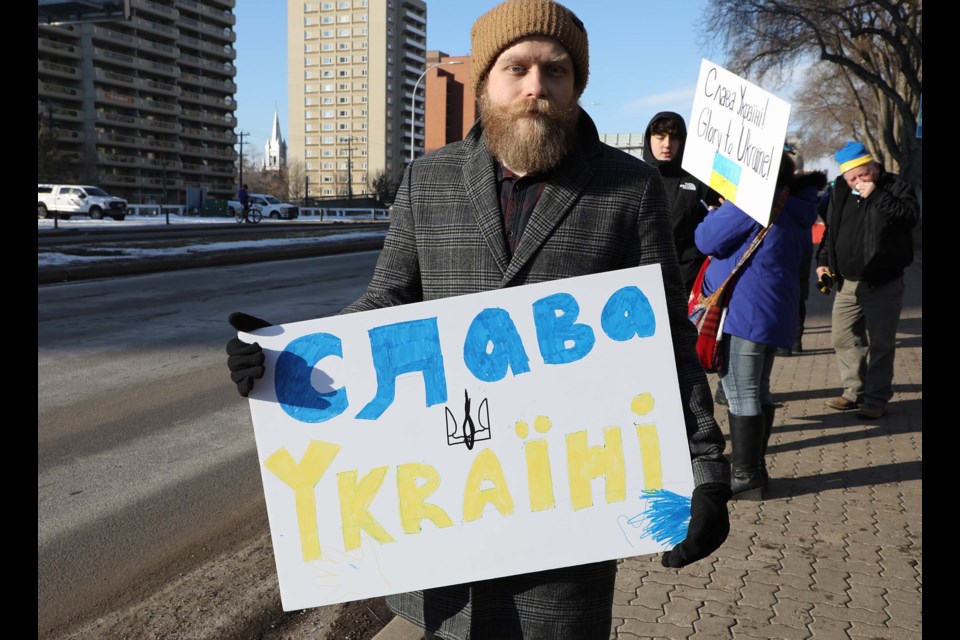Two weeks ago, Nicholas Sarabin, a Canadian English teacher living in Kyiv, was forced to flee Ukraine.
“I had my class on Friday evening … a date [planned] with a girl that I am madly in love with. I called my parents that night … everyone [was] worried about me, and I was saying everything's normal,” he said.
Sarabin fled the country with a backpack filled with his clothes on Feb. 13, leaving behind a fridge filled with food, dirty dishes in his sink, after what he describes as an intelligence leak from the U.S that changed everything among the group of foreigners he knows.
“All of a sudden everything was very different. Everyone was panicked, and everyone was leaving very fast,” he said.
On Feb. 21 Russia officially recognized contested territory in the east — Lugansk and Donetsk — which violated a treaty between the two countries.
Sarabin had only just arrived back to Canada and moved into his sister’s house in St. Albert when he received the news.
“I was in the middle of watching an Oilers game at the Brewhouse. I started seeing updates on my phone that they were moving in, and it was just so surreal,” he said.
Russia launched a full-scale invasion of Ukraine on Feb. 24.
Sarabin, who has lived in Ukraine for four years, said the people in Ukraine started worrying about Russia in mid-November.
“At first like it was fine, we weren't worried. But after a while, you could just feel that it was more serious this time,” he said.
It became very real when Russia put troops on the northern border of Belarus at the end of January.
“Because suddenly the troops are not 700 kilometres away. They're 150 kilometres away [from Kyiv],” said Sarabin.
Dr. Florian Gassner, an associate professor of Eastern and Northern European studies at the University of British Columbia, said in an interview with The Gazette, the most basic way to describe the situation is that Russia has invaded the territory of Ukraine and is trying to reach Kyiv to decapitate the government and bring the country under control.
Gassner said the war objectively started in 2014. But the warring parties came together in 2015 and hammered out a deal under the Minsk Agreement — which was confusing to read and essentially unimplementable.
Russian President Vladimir Putin insisted they were not a warring party at the time, Gassner noted.
Although it hasn’t been a constantly hot war since 2014, the shooting never stopped, said Gassner.
“Over 14,000 people lost their lives. A lot of civilians, Ukrainian civilians, who stepped on land mines or who were victims of indiscriminate shelling. And the last eight years have created something remarkable,” he said.
Simply, the Ukrainian people don’t want to be a part of Russia.
“Vladimir Putin is approaching this like it's the 18th century where there's a territorial dispute with two armies. One person is the winner — they have control over the territory and then they govern over these people by levying taxes from them,” he said.
Gassner said it is inconceivable that Putin will come in, install a puppet government, and people will abide by that.
Gassner said one important thing he would like people to know is that whenever you hear about the Russian rationalizations for these into this incursion, they're always very convoluted.
“Russia was justifying this attack to clear the government from fascists and Nazis who were engaging in genocidal activity against the Russian speakers in Ukraine,” he said, adding this statement is absurd for many reasons.
Russian is the first language for many people in Ukraine, including the democratically-elected president, Volodymyr Zelensky.
However, Putin needs a reason to justify his attack on Ukraine to the Russian citizens, said Gassner.
“So, the idea would then be that by protecting Russian speakers, they are protecting supposedly Russian citizens,” he said.
Putin has 190,000 troops on the border. Gassner said the numbers suggest Russia has the upper hand.
“But having the Ukrainian citizen re-voluntarily integrating into the Russian world, it's really hard to imagine,” he said.
Sarabin said his life is still in Ukraine. He is concerned about the people he left behind. He said they don’t want to be Russian. They hate Putin and they love their country.
“Ukrainians will fight. They will die. I don't understand what Putin wants out of this. He's got this dream of rebuilding the Soviet Union. But there is no reality where Ukrainians will accept that,” he said.
Sarabin said his ex-girlfriend in the Ukraine sent him a goodbye message — just in case.
“I asked my therapist, I asked, ‘Can you go and talk to her? Can you help her through this?' The advice that she gave was sitting there and waiting is the worst thing you can do for yourself and the best thing she can do is start fighting and start making Molotov cocktails.
“My therapist is telling my ex-girlfriend to make Molotov cocktails because that's the best thing she can do for her mental health.
“That's a real thing in my life.”



